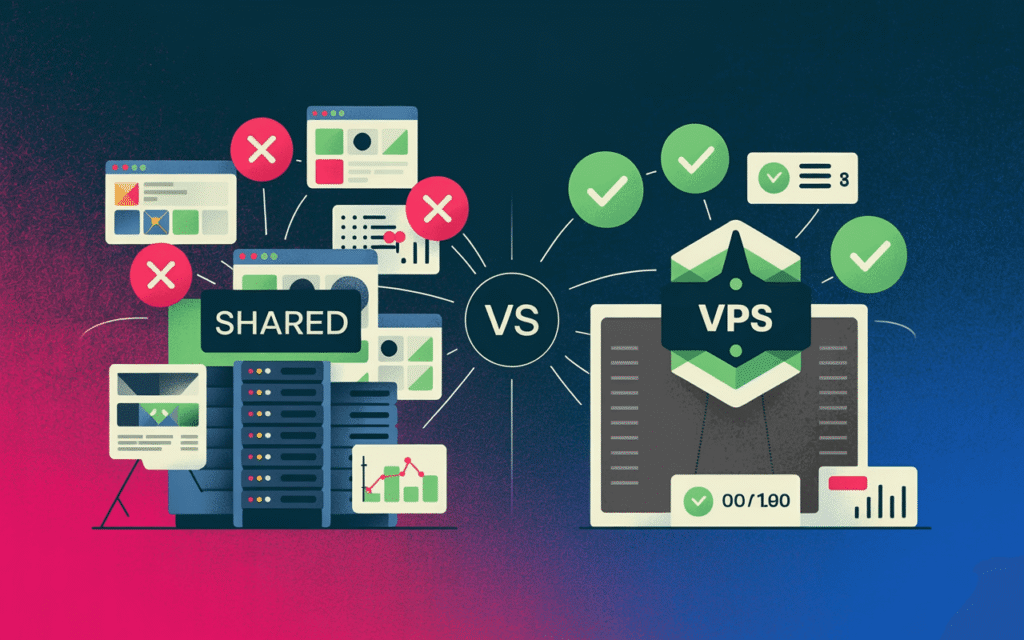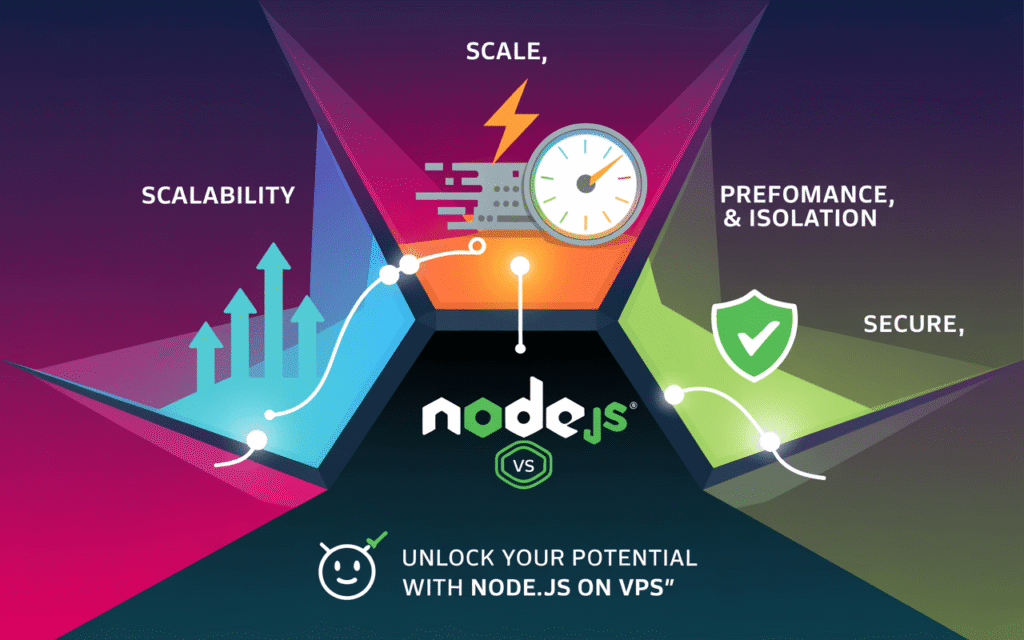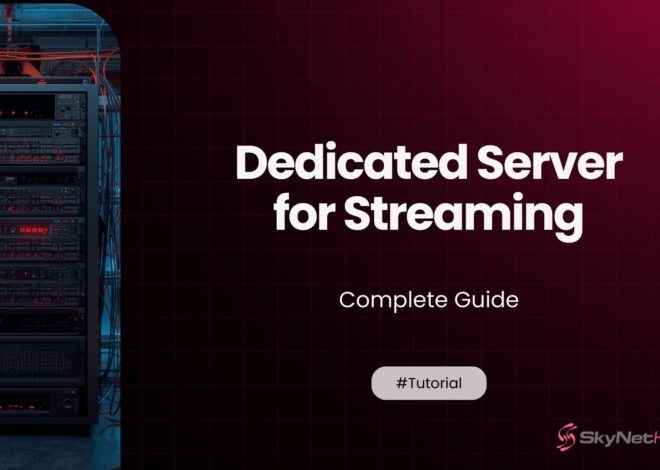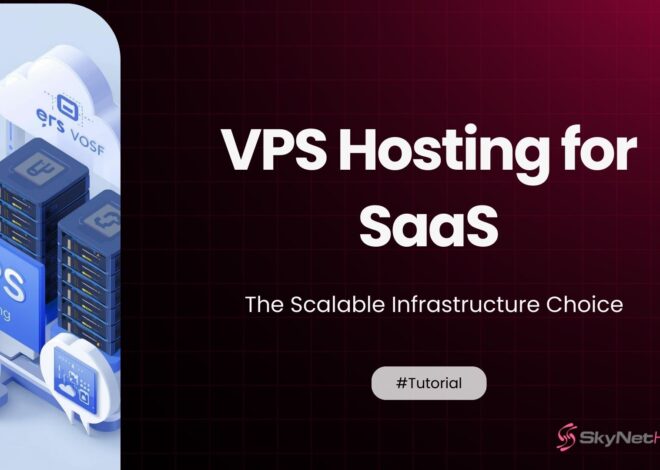
Why Node.js Works Best on VPS – A Complete Guide
TL;DR
- VPS hosting provides full control, dedicated resources, and reliable scalability—key for Node.js apps compared to the limitations of shared hosting.
- Node.js applications, especially real-time and resource-intensive ones, perform better and more consistently on VPS thanks to guaranteed CPU and RAM allocation.
- Root access on VPS enables Node.js developers to install any software, configure custom environments, use multiple app instances, and run process managers like PM2.
- VPS hosting is a cost-effective middle ground between restrictive shared hosts and expensive dedicated servers, delivering the performance needed for modern Node.js workloads.
- Skynethosting.net VPS solutions feature global SSD-powered servers, developer-centric features, and intuitive controls—ideal for Node.js hosting and scaling
If you’ve been working with Node.js, you already know how powerful it is for building fast, real-time applications. Its single-threaded, event-driven architecture makes it a top choice for everything from APIs and microservices to complex chat applications.
But here’s a question I see pop up all the time: “Where should I host my Node.js app?”
After a decade of deploying and managing applications, I’ve found a clear winner for most Node.js projects: Virtual Private Server (VPS) hosting. It strikes the perfect balance between control, performance, and cost. Shared hosting often feels too restrictive, while dedicated servers can be overkill and expensive.
This guide is my deep dive into why Node.js and VPS hosting are a perfect match. We’ll walk through what Node.js VPS hosting is, how to set it up, and how to get the most out of it. By the end, you’ll have a clear roadmap for deploying your Node.js app on a VPS with confidence.
What is Node.js VPS hosting?
Let’s break down the basics. When we talk about Node.js VPS hosting, we’re talking about a hosting environment specifically configured to run applications built with Node.js on a Virtual Private Server.
Definition of Node.js hosting
Node.js hosting is any hosting service that supports the Node.js runtime environment. This means you can run your server-side JavaScript code, install necessary npm packages, and deploy your applications.
It’s not just about having Node.js installed; it’s about having an environment that gives you the control you need to manage your application’s lifecycle effectively.
How VPS differs from shared hosting for Node.js apps

The biggest difference between VPS and shared hosting comes down to resources and control.
On a shared hosting plan, you’re sharing a server’s resources—CPU, RAM, and disk space—with hundreds, sometimes thousands, of other websites. This setup is cheap, but it comes with significant limitations for a Node.js developer.
You typically have little to no control over the server environment, can’t install custom software, and your app’s performance can be affected by “noisy neighbors” who are hogging resources. For a dynamic, real-time Node.js app, this is often a deal-breaker.
With VPS hosting, you still share a physical server, but a hypervisor carves out a dedicated slice of resources just for you. This slice acts as an independent, private server. You get your own operating system, dedicated RAM and CPU, and full root access. This isolation means other users on the physical server can’t impact your app’s performance, and you have the freedom to configure the environment exactly as you need for your Node.js backend.
Why does Node.js work best on VPS?
The nature of Node.js applications—often long-running and resource-intensive—makes them uniquely suited for the control and dedicated resources that a VPS provides.
Full control with root access for Node.js configurations
One of the best parts of using a VPS is having root access. This gives you complete control over your server environment. You can:
- Install any version of Node.js and npm you need.
- Set up environment variables for your application.
- Configure reverse proxies like Nginx or Apache to manage traffic.
- Install databases like MongoDB or PostgreSQL directly on your server.
- Set up firewalls and other security measures.
This level of control is something you simply can’t get with shared hosting. It allows you to create a perfectly tailored environment for your Node.js on a cloud VPS.
Dedicated resources for real-time apps
Node.js excels at building real-time applications like chat apps, online games, and live data dashboards. These apps maintain persistent connections and can be sensitive to latency and resource availability.
On a VPS, your application gets a guaranteed amount of RAM and CPU. This ensures consistent performance, which is crucial for delivering a smooth user experience.
You don’t have to worry about your app slowing down because another website on the server is experiencing a traffic spike. This makes VPS hosting for real-time apps the most reliable choice.
Ability to run multiple Node.js processes
As your application grows, you might need to run multiple Node.js processes to handle increased traffic or to run different microservices. With root access on a VPS, you can use process managers like PM2 or Forever to manage multiple Node.js instances effortlessly.
This allows for better scalability and fault tolerance, as the process manager can automatically restart a process if it crashes.
How to set up Node.js on a VPS?
Getting your Node.js server setup on a VPS is straightforward. Here’s a general roadmap to get you started.
Installing Node.js and npm on VPS
The first step is to connect to your VPS via SSH and install Node.js and its package manager, npm. I recommend using Node Version Manager (nvm) for this.
Nvm allows you to easily install and manage multiple versions of Node.js on the same server, which is incredibly handy if you’re working on different projects with different version requirements.
You can typically install nvm with a simple curl command from its official GitHub repository. Once nvm is installed, you can install the latest LTS (Long Term Support) version of Node.js with a single command:nvm install --lts
Setting up Express.js or other frameworks
With Node.js installed, you can now set up your application framework. Express.js is the most popular choice for building web applications and APIs with Node.js.
To start a new project, you’ll create a directory for your app, initialize a new Node.js project with npm init, and then install Express:npm install express --save
From there, you can create your main application file (e.g., app.js) and start building your routes and logic. This process is similar for other frameworks you might choose for hosting your Node.js backend on a VPS.
Running Node.js apps with PM2 or Forever
For a production environment, you should never run your Node.js app directly with node app.js. If the app crashes or the server reboots, it won’t restart automatically.
This is where process managers like PM2 or Forever come in. My personal preference is PM2 because of its rich feature set, including clustering, log management, and application monitoring.
You can install PM2 globally via npm:npm install pm2 -g
Then, you can start your application with PM2:pm2 start app.js
PM2 will keep your app running in the background and automatically restart it if it fails. This is a critical step in any professional Node.js deployment guide.
What are the benefits of Node.js VPS hosting?

Choosing a VPS for your Node.js app brings tangible benefits that support your application’s growth and stability.
Scalability for growing apps
One of the biggest advantages of VPS hosting is its scalability. As your application’s user base and traffic grow, you can easily upgrade your VPS plan to get more RAM, CPU, or disk space.
With most providers, this can be done with just a few clicks and minimal downtime. This ensures your app can handle growth without needing a complete migration to a new server.
Better performance than shared hosting
Performance is a non-negotiable for modern web applications. With dedicated resources, your Node.js app will run significantly faster and more reliably on a VPS compared to shared hosting.
The isolation from other users means your app’s performance remains consistent, leading to lower latency and a better experience for your users.
Security and isolation from other users
On a shared server, a security breach on one website can potentially affect all other sites on that server. A VPS provides a secure, isolated environment. Your file system is private, and you have your own instance of the operating system.
You can also configure your own firewall rules and implement other security measures, giving you much tighter control over your application’s security.
Why choose VPS over shared or dedicated hosting for Node.js?
Let’s put VPS in context by comparing it to the other popular hosting options.
VPS vs Shared Hosting for Node.js apps
As we’ve discussed, shared hosting is often too restrictive for Node.js. The lack of root access, shared resources, and inability to run long-running processes make it an unsuitable environment for anything beyond a very simple, low-traffic application. A VPS gives you the freedom and power you need.
VPS vs Dedicated Servers for cost and flexibility
A dedicated server gives you an entire physical server to yourself. This offers maximum performance and control, but it comes at a much higher cost. For many startups and small businesses, a dedicated server is overkill.
A VPS offers a similar level of control and flexibility as a dedicated server but at a fraction of the price. You can customize your environment and scale resources as needed, making it a much more cost-effective solution for most Node.js applications.
VPS as a middle ground for performance and affordability
VPS hosting truly is the sweet spot. It provides the performance and control needed for serious Node.js development without the high price tag of a dedicated server. It’s the perfect, affordable Node.js VPS option that doesn’t compromise on essential features.
Why Skynethosting.net VPS is ideal for Node.js developers
When looking for the best VPS for Node.js hosting, you want a provider that understands developers’ needs. Based on my experience, Skynethosting.net stands out for several reasons.
Global data centers for low-latency apps
Latency is the enemy of real-time applications. Skynethosting.net offers data centers in multiple locations worldwide. By choosing a data center close to your target audience, you can significantly reduce latency and improve the responsiveness of your application.
SSD-powered VPS for high-speed performance
All of Skynethosting.net’s VPS plans are powered by high-speed SSD storage. SSDs are much faster than traditional HDDs, which means faster file access, quicker database queries, and overall better performance for your Node.js app. This is especially important for I/O-intensive applications.
Developer-friendly features (SSH, WHMCS, cPanel optional)
Skynethosting.net provides full SSH access, which is essential for managing your server. They also offer optional add-ons like cPanel and WHMCS, which can be useful for managing your hosting environment or even starting your own reseller business. This flexibility caters to a wide range of developer needs.
How to optimize Node.js performance on a VPS?
Once your app is deployed, your work isn’t done. Here are a few strategies for performance optimization.
Load balancing and caching strategies
If you’re running multiple instances of your app, you’ll need a load balancer to distribute traffic evenly among them. Nginx is a popular choice for this and can be set up as a reverse proxy.
Caching is another powerful technique. You can use tools like Redis to cache frequently accessed data, reducing the load on your database and speeding up response times.
Monitoring VPS resources for Node.js apps
Keep a close eye on your server’s resource usage (CPU, RAM, disk I/O). Tools like htop can give you a real-time view of your server’s processes. PM2 also has a built-in monitoring feature. Proactive monitoring helps you identify and address performance bottlenecks before they impact your users.
Using reverse proxies (Nginx/Apache)
Setting up a reverse proxy like Nginx in front of your Node.js application is a best practice. It can handle tasks like load balancing, SSL termination, serving static files, and caching. This offloads work from your Node.js process, allowing it to focus on handling application logic, which improves overall performance and security.
Time to Launch Your App
So, is VPS the best hosting for Node.js apps? For the vast majority of projects, the answer is a resounding yes.
The combination of full root access, dedicated resources, and scalability makes it the ideal environment for developing, deploying, and scaling powerful Node.js applications. It gives you the control of a dedicated server with the affordability and flexibility of a cloud platform.
When you’re ready to deploy your Node.js app on a VPS, a provider like Skynethosting.net gives you the tools and infrastructure you need to succeed. With their developer-friendly features and high-performance hardware, you can build with confidence.
Take the next step and give your Node.js application the powerful hosting it deserves.
FAQs
Why is VPS better than shared hosting for Node.js apps?
VPS offers dedicated resources, root access, and security isolation—allowing optimal Node.js app performance beyond what’s possible with shared hosting.
How does VPS hosting enhance Node.js app scalability and reliability?
With VPS, resources can be upgraded instantly and apps can be managed using tools like PM2 for process scaling and fault tolerance.
What developer features make Skynethosting.net VPS ideal for Node.js?
Full SSH/root access, SSD storage, global datacenters, and optional cPanel/WHMCS provide the flexibility and performance Node.js developers need.
How do you optimize Node.js performance on a VPS?
Use load balancing (Nginx), caching (Redis), reverse proxies, and monitor resources with htop and PM2 to ensure stable and fast delivery.
What are the main advantages of running Node.js apps on a VPS?
Custom environment setup, dedicated performance, strong security controls, and affordable scalability make VPS the prime hosting environment for Node.js.



